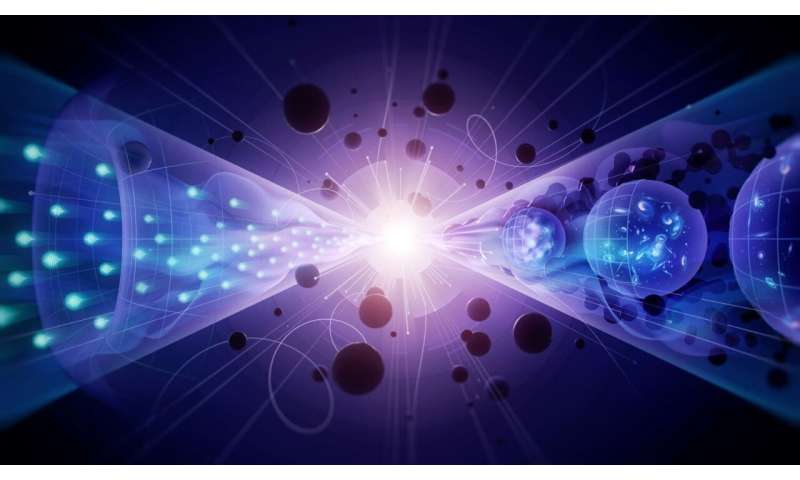Physicist helps set the US priorities for investing millions in particle physics

There are 32 signatures marking approval of the new report from the 2023 Particle Physics Project Prioritization Panel.
From Shoji Asai to Robert Zwaska, the signatures are all so different: Some are sharp and spiked. There are loop de loops. A few scratches, a few flourishes. What about Iowa State University's Amanda Weinstein's? There's Amanda with a big, looping A, another loop for middle initial J, then a sharp W and a long line to cross the t and finish up.
It's a credentialed and accomplished panel of physicists, but as those signatures illustrate, they're all individuals. They're from all over the country (with a few based around the world) and they all have very different backgrounds, perspectives and research programs in high-energy physics. That's the kind of physics that explores the small-scale world of subatomic particles, energies, properties and behaviors.
All those physicists worked together to decide on an updated 10-year strategic plan, with 20-year implications, for the country's particle physics future. Those priorities equal hundreds of millions in investments for the U.S. Department of Energy and the U.S. National Science Foundation to consider.
And yet, said Weinstein, an associate professor of physics and astronomy, all those individual physicists made their decisions and wrote their plan without taking a vote.
"It was very much a consensus," Weinstein said. "We just kept talking things through until everyone was happy with the decisions. It was never a voting process. It was shocking how well things converged past a certain point."
The process was, she said, "all very collegial given the stakes of what we had to decide."
Sharing her expertise and her voice
In November 2022, Weinstein found an email from Hitoshi Murayama of the University of California, Berkeley, and Karsten Heeger of Yale University.
The chair and deputy chair, respectively, of the priority panel (known as P5) wanted to know if Weinstein would join the group.
The invitation was "a little bit of a surprise," said Weinstein, who has a doctorate from Stanford University. Like some others on the panel, she has expertise in multiple areas of high-energy physics, including gamma ray astronomy, collider physics and neutrino research. That broad perspective allowed her to "cross over and appreciate the importance of other areas of physics."
Accepting the invitation would mean meetings and working groups. Community planning reports, town halls, talks, tours and white papers. And "long, extended days of discussion," Weinstein said.
Once the P5 process starts, "You never really stop," she said. "When at a P5 meeting, you get nothing else done. It isn't possible. You're 100% focused. All your energy is going into these discussions, into the process."
Weinstein embraced the commitment.
"This isn't an invitation you turn down," she said. "I do this work because I love it. Because I think it's important. Because I enjoy it.
"I've always had opinions about where these investments should go. To say no is to surrender my voice, and that's not something I could do."
A plan for major innovations
The P5 report, "Exploring the Quantum Universe: Pathways to Innovation and Discovery in Particle Physics," was released in December.
It identifies three science themes, each containing two focus areas with high research potential over the next 10 to 20 years:
- "Decipher the Quantum Realm"—"Elucidate the Mysteries of Neutrinos" and "Reveal the Secrets of the Higgs Boson"
- "Explore New Paradigms in Physics"—"Search for Direct Evidence of New Particles" and "Pursue Quantum Imprints of New Phenomena"
- "Illuminate the Hidden Universe"—"Determine the Nature of Dark Matter" and "Understand What Drives Cosmic Evolution"
The panel made five major recommendations to do that:
- Complete construction and support operations of ongoing experiments such as the first phase of DUNE, the Deep Underground Neutrino Experiment, an international neutrino experiment that includes Weinstein and other Iowa State collaborators. The experiment will shoot a beam of neutrinos from Fermilab near Chicago to a massive detector built one mile underground in a former gold mine in western South Dakota.
- Construct five major projects "that collectively study nearly all fundamental constituents of our universe and their interactions." The first priority is to build an experiment called CMB-S4, a ground-based cosmic microwave background experiment that will look at the early universe.
- Improve the balance of small-, medium- and large-scale projects supported by federal investment.
- Develop the theoretical, computational and technological infrastructure to support the country's physics goals.
- And build a technological workforce for particle physics and the country.
What's the return on investment for the U.S.?
"Particle physicists have a long history of recognizing, embracing, and fostering emerging technologies," the panel wrote. "The devices and tools that particle physics develops enable applications beyond fundamental physics in fields as different as medicine and aerospace."
In the years ahead, the panel sees particle physics contributing to advances in computing, artificial intelligence, machine learning, quantum information science, microelectronics, detectors, instruments and particle accelerators. All of that can lead to new technologies for health care, material science, industry and national security.
Particle physics investments also yield discovery and inspiration.
"Discoveries of new laws of nature that deepen our understanding of the inner workings of the universe not only excite scientists but continue to amaze the public and inspire many people to pursue careers in science, technology, engineering, and mathematics—the STEM fields," the panel wrote.
"Nurturing and developing the next generation of scientists and training a highly-skilled workforce are two of the benefits to society."
Weinstein and the other P5 signatories concluded their report by directly addressing America's taxpayers: "We are keen to bring knowledge and excitement of major innovations and discoveries to the people who paid for them. Join us as we explore the quantum universe."
Provided by Iowa State University